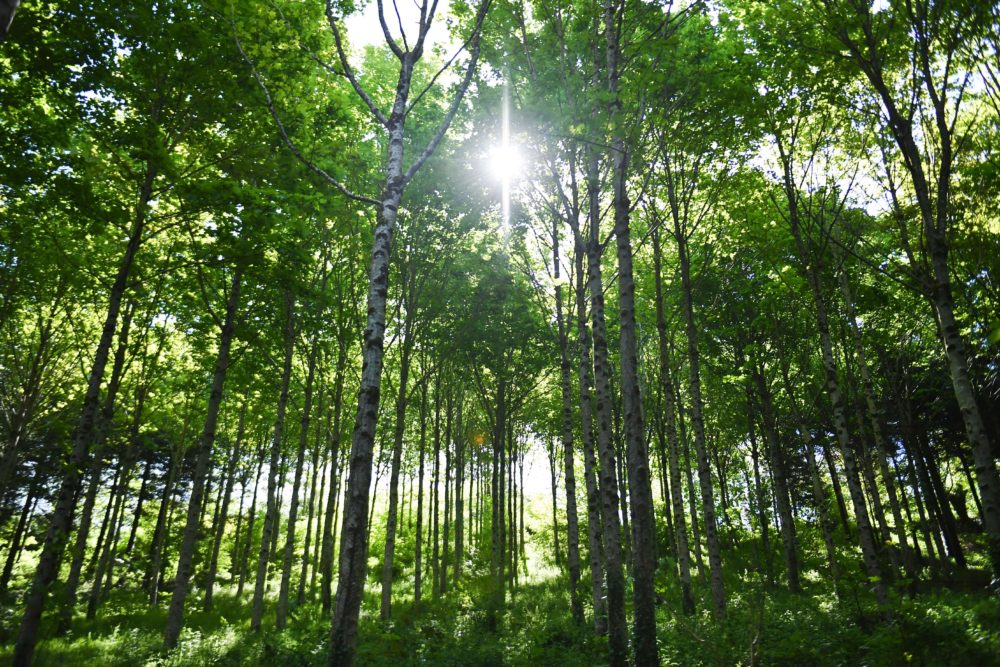We need to consciously connect to other creatures of God, such as animals and plants, understanding our deep interconnectedness with them and cultivating love and compassion for them.
So busy are most of us that we do not make time to watch the moon floating in the sky or even take more than a fleeting glance at the rose blooming in a pot in our balcony. We fail to connect with the beauty of Nature around us, which remains abundantly evident even in a busy metropolis.
Just beyond a busy road that’s littered with craters and clogged with heavy traffic lies an island of green calm”Mount St. Joseph campus”an ideal place to savour the beauty of Nature even in Bangalore’s urban sprawl. That’s where I was blessed to spend some time recently, at the Prerana Ignatian Spirituality Centre, as a participant in a two-day residential course on Eco-Spirituality. The campus exudes the cheerfulness, neatness and order that characterises almost all other such Catholic institutions I’ve been to. The abundantly green surroundings are really something like a bit of Heaven!
Fr. Lumnesh’s concern for the ecology was clearly evident and quite infectious. From him we learnt how human beings are part of Nature (rather than standing outside it) and of our deep interconnectedness with all other beings. One needs to cultivate a spiritual sensitivity to discern the oneness of all beings, beyond differences of things like religion, ethnicity and even species.
We had plenty of time for group discussions, where we reflected on issues such as the root causes of the destruction of nature, global warming, noise and air pollution, plastic accumulation, floods and water scarcity, the extinction of species and the fact that human beings are the main culprit behind the ecological crisis. Greed, lack of God-consciousness, materialism, senseless urbanization, and other such factors lay under the current crisis.
But we didn’t just lament the state of affairs that we are faced with. Fr. Lumnesh also wove in issues related to spirituality and suggested the root of the issue of ecological destruction is a spiritual crisis. That means that it requires spiritual transformation in individuals and a revamping of our worldviews (including about such existential questions as to the purpose of life) to seek to address it. Fr. Lummesh also encouraged us to think about some practical things that could be done to address the issue. While we cannot change or solve all ecological problems, at least we can bring about some changes at our personal level such as being more conscious of our usage of things like water, electricity and plastic and trying to lead a minimalistic lifestyle. We need to consciously connect to other creatures of God, such as animals and plants, seeing our deep interconnectedness with them and cultivating love and compassion for them. The flowers, birds and animals, trees, all are our ‘cousins'”that’s another of the many things I learnt from Fr. Lumnesh. Every species is performing a valuable function in the grand scheme of things, where all beings are closely interdependent. Even a little earthworm is doing so much good, by helping the composting of waste.
The eco-spirituality course did a world of good for me. I hope it has made me more sensitive to the environment around me and to walk more lightly on it, in terms of my use of its ‘resources’. The course strongly underlined the fact that ‘development’ is not about building concrete structures and encroaching into green spaces. Nor is it the mindless production and consumption of ‘goods’. We are digging our own graves by chasing out animals and trees from their homes. Nature will show her fury, and already signs of it are happening all across the world.
Working to protect the Earth and the manifold life-forms that it hosts can be a great way for interfaith cooperation and solidarity, with people from different communities, countries and religions joining hands to make practical efforts to care for our common global home that is Planet Earth. Eco-spirituality can be a firm basis to unite people from different religious, national and ethnic backgrounds.
My heartfelt thanks to Prerana for hosting such a wonderful course, and my thanks, of course, to Fr. Lumesh, for conducting it so beautifully.
(Prerana organises regular courses, on a range of issues. These are of short duration, which makes them particularly convenient for people with busy schedules. Course fees are quite affordable by middle-class standards. To know more about the courses, see Prearana’s website: www.preranaisc.org)
(By Nigar and Dolcy)


COMMENTS